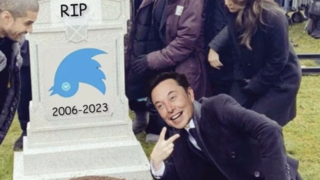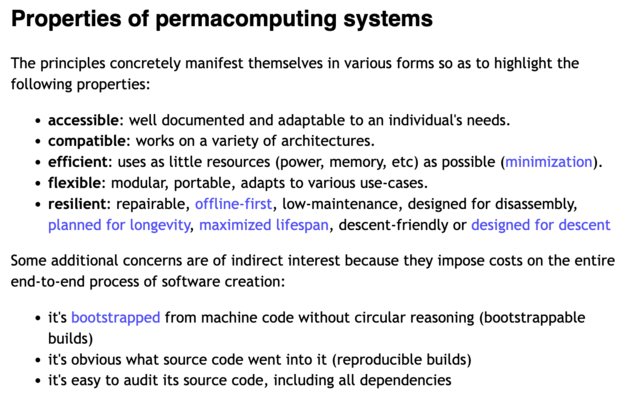thinking about tech! let's move slow & mend things
⫘⫘⫘⫘⫘⫘⫘⫘⫘⫘⫘⫘⫘⫘⫘⫘⫘⫘⫘
2 book reviews, ⚗️critical distillations⚗️ about tech, and a call to move slow & mend things⚘

After the thorough enshittification of Twitter, I've pretty much abandoned the platform in my day-to-day usage—save for the occasional casual lurking. Make no mistake, this act of lurking isn't a mourning for the demise of Twitter. There are no tears for the platform! But there's plenty of mourning over deranged memebots and humor, unhinged fandom moments, softer corners celebrating poetry, history, literature etc, and the endless invitations to step off the platform and further into the world wide web...that casual magic is really weak now, but every now and then I step back into for a whisper of this feeling.
˚ ༘ ೀ ⚘˙⋆。˚❍୭ ̥̣̩⋆˚₊⍋˚❀⋆.ೃ࿔・❃ུ۪
Leaving social media platforms is hard. Your friends, family and random kindred strangers are on this site! If/when you leave, there's nearly no way to aggregate everyone on the same platform. The switching costs are high. Social media networks are nothing without their users and Big Tech knows this all too well. It's the same reason why so many companies are hell-bent on creating a comprehensive ecosystem (Meta with FB, IG, Whatsapp; Apple with their 4828472 products and cursed offsprings; Google with youtube, gmail, gdrive, gdocs, gmaps...etc etc). These companies seek to lock you into their world, and there doesn't seem any limits as to when they'll stop (think Coraline's Other Mother and her spindly long fingers!!!). This manifests in countless ways: Microsoft Word turning up glitchy on a MacOS desktop, a narrow selection of applications available on app stores, or even the inability to fully read a Tweet on a mobile browser without logging in. While these make for an unpleasant and frustrating user experience, there aren't existing regulations curbing this manner of Big Tech's growth and reach. Today, I doubt it's any surprise that these behemoth companies' market capitalisation can match entire countries' GDPs.
But what if there was a way to break up Big Tech? How would that feasibly pan out?
"We've tried making Big Tech into better tech for decades. That project has been an abject failure. To make tech better, we have to make it smaller-small enough that the bad ideas, carelessness and blind spots of individual tech leaders are their problems, not everyone else's. We need lots of tech, run by lots of different kinds of people and organizations, and we need to make it as close to costless as possible to switch from one to the other." - Cory Doctorow
In The Internet Con: How to Seize the Means of Computation, Doctorow makes a case for interoperability. He argues that Big Tech's dominance (coining them as Walled Gardens) can be attributed to legal structures and defences, rather than merely through engineering and design. He makes a case for pressuring tech companies towards interoperability.
Interoperability, where any platform or system can seamlessly interact with another, is presented as a way to break down these walls:
- taking away the cost of switching (e.g. I can view someone's IG post on my email account without having to download or use IG),
- encouraging competition and the creation of tinier companies,
- and lastly, collectively empowering people to make their own choices in the platform they opt to use.
He claims that it's a way to make the Internet more free and democratic, cutting down the influence of Big Tech and placing the power of choice directly into people's hands.
Interoperable systems can be a powerful vehicle for diversity and user autonomy within tech. It's also hardly a novel concept. Most of our daily interactions with technology actually rely on it!
"Interoperability is what allows the massive tangle of interfaces that we call the Internet to function—to retrieve Emails, web pages, and “All Your Base” memes. As Harvard scholars John Palfrey and Urs Gasser have argued, interoperability born from that early Internet age has enabled consumer choice, encouraged technological progress, promoted competitive markets, and opened up efficiencies and conveniences that have made the highly connected society in which we live today" - Charles Duan in You Are Not Expected to Understand This: How 26 Lines of Code Changed the World
🆕💡😵💫 With its velocity and volume, there's a constant celebration of novelty and innovation surrounding technology (Silicon Valley and Wall Street hype cycles like cryptocurrency, NFTs, now GenAI, e/acc insanity etc etc!). Most of it is created through meticulous branding, or mindless sensationalism1. But there's not so much equivalent hype in examining the everyday, equally important—if not, more so important—work of maintenance and care of both software and hardware. There's an adage that good design is invisible. I think it extends nicely to our technological systems as well.
We rarely give much thought to computer code and its origins. You Are Not Expected to Understand This: How 26 Lines of Code Changed the World unravels the fascinating stories behind groundbreaking lines of code that enable us to live, work, play and even venture into space. But more pressingly, this book reminds me to keep thinking critically about tech! Here are some threads for picking:
☞︎︎︎ On invisible backend labours & our very intermeshed machines
- #️⃣ comments embedded in code as a little "meta-message hidden in these silent libraries of intellectual endeavors where moments for sharing are nonetheless baked into the process-that it's people who write programs. And, more importantly, that communities of people will maintain and preserve them."
- 💕🩸Open-source libraries and software are the backbone of so! much! tech, and yet tending to these libraries are not really as revered. The 2014 Heartbleed bug fiasco serves as a powerful cautionary tale about this! The bug was found in a single line of code in the open-source library called OpenSSL, used in vital security software from large corporations to smaller businesses. This vulnerability meant online encrypted information could be easily leaked. The extensive use of OpenSSL exacerbated this.
One of the primary lessons of Heartbleed was that open-source code like OpenSSL needed stronger institutional support for security, rather than just relying on volunteer efforts to find vulnerabilities. Years after its discovery, the Heartbleed vulnerability had been fixed on most devices and websites, but its legacy was an important one for thinking about our reliance on open-source software libraries and how we support the maintenance and security of these sorts of crucial, shared resources. - Josephine Wolff
☞︎︎︎ Technologies do not emerge in silos; it's intricately tied to specific social realities & historical contexts. But what happens when these contexts evolve across time?
- 🔛The last chapter of the book talks about how gender is historically encoded in our information management systems, typically stored as a boolean (true vs false! a gender binary if you will) data type instead of string (aka text). This choice of data type allows for greater system efficiency. However, this ever-increasing demand to create optimal systems invariably reinforces existing social norms, whether consciously or subconsciously. When these social norms evolve over time, our softwares might not be able to keep up. To start registering gender as a more fluid data field instead of a binary, we have to overhaul certain archaic info systems and their ways of encoding.
- 🚘 It's not just about social change, but also the responses to these changes. For example, when the US started regulating carbon emissions for its private car industry, Volkswagen developed a (sneaky!) digital system of undercounting carbon emissions to elude the law.
"[D]igital systems can be used to circumvent rules made under different technological realities." While we endlessly chase ~ economic digitalisation ~, it's also pertinent to note that numbers and data don't speak for themselves2. Critically assessing their contexts are always crucial for conducting accurate and ethical analysis.
☞︎︎︎ On human-machine interactions.
🕸️🕷️ I'm trying to attune myself more to this webby arena of human-machine/machine-machine/human-human interactions!! From hyperlinks as weaving paths of the internet to the work of digitising languages online, there is a myriad of interactions to unravel and make sense of 🔎📔
˚ ༘ ೀ ⚘˙⋆。˚❍୭ ̥̣̩⋆˚₊⍋˚❀⋆.ೃ࿔・❃ུ۪ This post really stems from an ongoing attempt to grapple with my own grievances about tech, how we think about it, and how we act towards it. I'm frustrated by the incessant chase of the latest shiny bandwagon to jump onto, the shallow adoption of buzzwords and so-called disruptive tech without slowing down to really engage with it meaningfully, or think critically about its consequences3. Its trade-offs are typically shrugged off as a means to an end, but I don't think we have a clear picture of any exact, ethical end. I'm tired of the bland hegemony of the tech scene, the dark forest of the web and the burgeoning flood of GenAI content4.
And yet - dream we must! I'm trying to find pockets of resistance, pluralism, inspiration and joy amidst it all. To move slow, and mend things5 with technology.
⚘ Reclaiming and rethinking technology! Developh is a powerhouse. I also really like the work of Feelers, a local art and tech label.
⚘ Permacomputing—which stems from the concept of permaculture—is "a concept and a community of practice oriented around issues of resilience and regenerativity in computer and network technology". A lovely example is the Low Tech Magazine, powered by solar power.

A screengrab from permacomputing.net
I want to learn more about permacomputing and apply it! I recently starting tinkering around with Raspberry Pi, a microcontroller. It scratches an itch because for a start, it's incredibly 'low-tech' and hands-on. I like that it's tactile and immediate. I'm still feeling its edges, and very much dwelling in an ~ inchoate-ness ~.
⚘ Poetry Camera by designers Kelin Carolyn Zhang and Ryan Mather. Powered by a Raspberry Pi microcontroller and meticulous design, this camera generates poetry(through OpenAI's GPT-4 model) based on the images it captures. The machine facilitates human interaction and play in a very poetic way, as explained by designer Kelin. Now that's a use of GenAI I can get behind! I'm tempted to make one too.
"I want to make a critical and joyful fuss about these matters. I want to stay with the trouble, and the only way I know to do that is in generative joy, terror, and collective thinking." - Donna J. Haraway in Tentacular Thinking
Here's to moving slow, and mending things.
⫘⫘⫘⫘⫘⫘⫘⫘⫘⫘⫘⫘⫘⫘⫘⫘⫘⫘⫘
Books mentioned:
- The Internet Con: How to Seize the Means of Computation by Cory Doctorow
- You Are Not Expected to Understand This: How 26 Lines of Code Changed the World by Torie Bosch
⫘⫘⫘⫘⫘⫘⫘⫘⫘⫘⫘⫘⫘⫘⫘⫘⫘⫘⫘
AI does not 'hallucinate', nor does it necessarily have 'emergent properties'. Ted Chiang describes ChatGPT as a 'blurry jpeg of the web', and I'm inclined to agree with him.↩
Everyone say thank you, Data Feminism.↩
For instance, AI at scale is a lot of work and demands way too much energy.↩
Does the internet feel increasingly lifeless to you, ridden with ads, trolls, bots, clickbait etc? That's what led Yancey Strickler to coin the Dark Forest Theory of the Internet. Add GenAI to the mix, and the dark forest bloats. Also, we're running out of high quality data(read: human, organic data) to train our AI models. Hmm. Go figure.↩
An antithesis of Facebook's infamous motto 'move fast and break things'↩